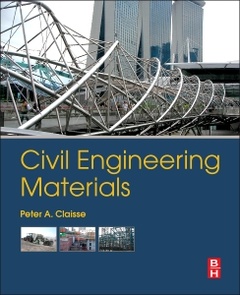Civil Engineering Materials
Auteur : Claisse Peter A.

Civil Engineering Materials explains why construction materials behave the way they do. It covers the construction materials content for undergraduate courses in civil engineering and related subjects and serves as a valuable reference for professionals working in the construction industry. The book concentrates on demonstrating methods to obtain, analyse and use information rather than focusing on presenting large amounts of data. Beginning with basic properties of materials, it moves on to more complex areas such as the theory of concrete durability and corrosion of steel.
1. Units
2. Strength of Materials
3. Failure of Real Construction Materials
4. Thermal Properties
5. Pressure
6. Electrical Properties
7. Chemistry of Construction Materials
8. Properties of Fluids in Solids
9. Transport of Fluids in Solids
10. Transport of Ions in Fluids
11. Ionising Radiation
12. Variability and Statistics
13. Use of Test Results
14. Specifications and Standards
15. Reporting Results
16. Testing Construction Materials
17. Introduction to Cement and Concrete
18. Cements and Cement Replacement Materials
19. Aggregates for Concrete and Mortar
20. Hydration of Cement
21. Concrete Mix Design
22. Testing Wet and Hardened Concrete
23. Creep, Shrinkage, and Cracking of Concrete
24. Admixtures for Concrete
25. Durability of Concrete Structures
26. Production of Durable Concrete
27. Assessment of Concrete Structures
28. Mortars and Grouts
29. Special Concretes
30. Steel
31. Corrosion
32. Alloys and Non-Ferrous Materials
33. Timber
34. Masonry
35. Plastics
36. Glass
37. Bituminous Materials
38. Composites
39. Adhesives and Sealants
40. Comparison of Different Materials
41. New Technologies
42. Tutorial Questions
Undergraduate students in civil and construction engineering programs; early career civil engineers; researchers
- Discusses the broad scope of traditional, emerging, and non-structural materials
- Explains what material properties such as specific heat, thermal conductivity and electrical resistivity are and how they can be used to calculate the performance of construction materials.
- Contains numerous worked examples with detailed solutions that provide precise references to the relevant equations in the text.
- Includes a detailed section on how to write reports as well as a full section on how to use and interpret publications, giving students and early career professionals valuable practical guidance.
Date de parution : 09-2015
Ouvrage de 528 p.
19x23.4 cm
Disponible chez l'éditeur (délai d'approvisionnement : 14 jours).
Prix indicatif 72,35 €
Ajouter au panierThèmes de Civil Engineering Materials :
Mots-clés :
accelerators; acids; adsorption; air content; air entrained; air entrainers; alkali aggregate reaction; aluminium; architectural concrete; asphalt; atoms; bamboo; basic creep; bitumen; blocks; Bogue equations; brick bond; brickwork; building codes; building control; bulk modulus; capillary suction; carbon footprint; carbonation; cathodic protection; cement; cement hydration; cement replacements; cement standards; chemical elements; chemical pH; chloride migration; citations; composites; compress



